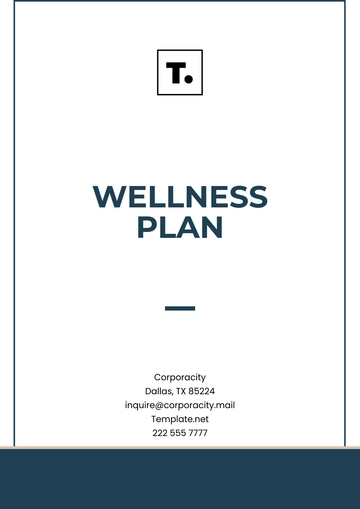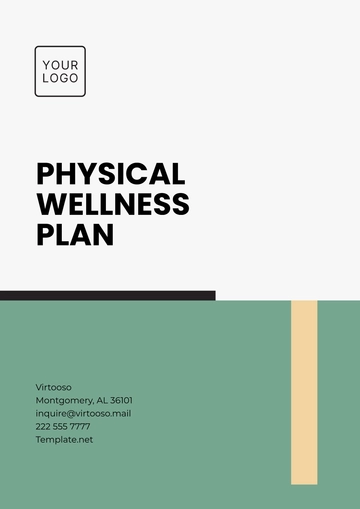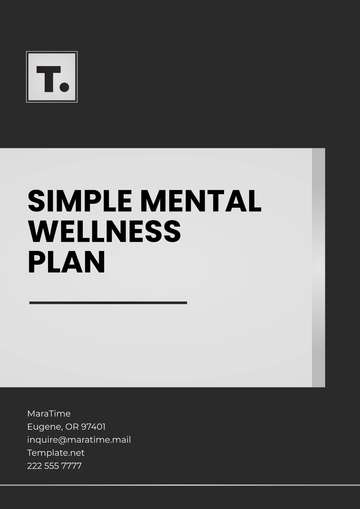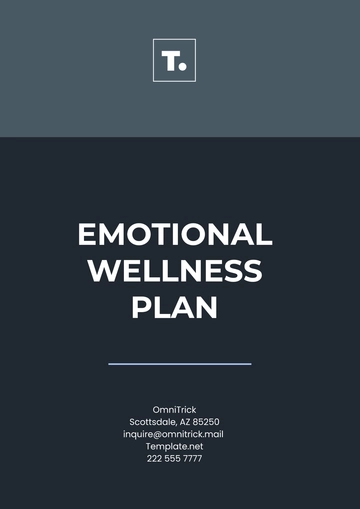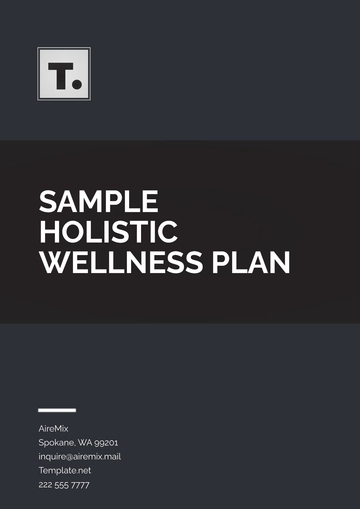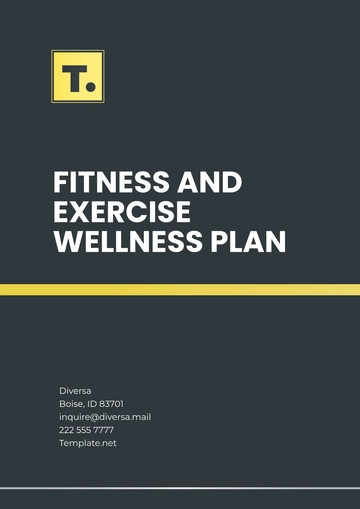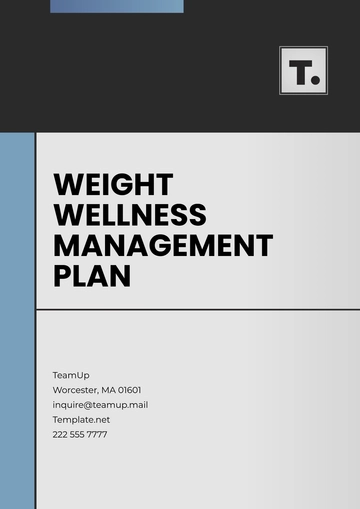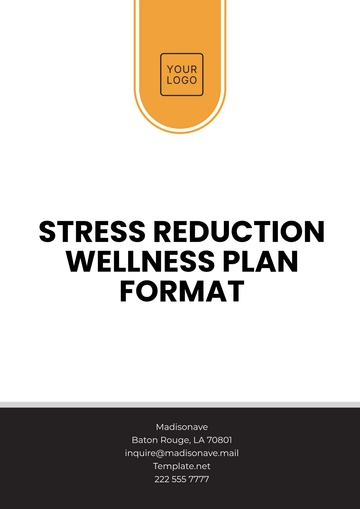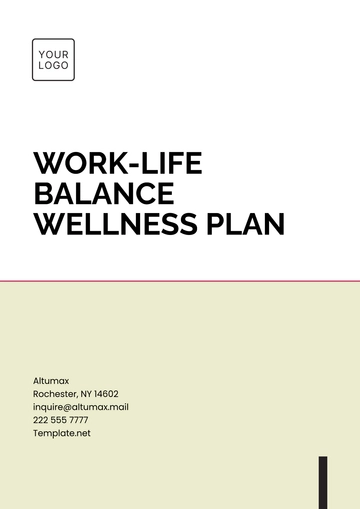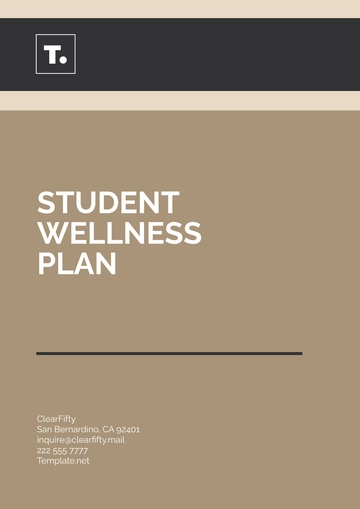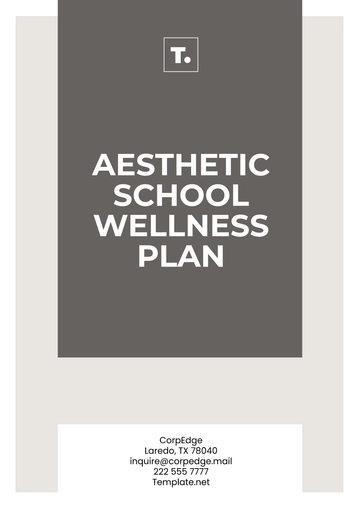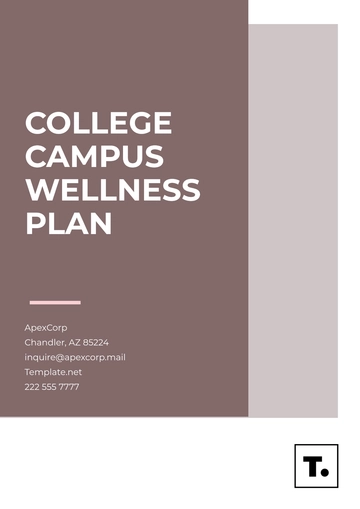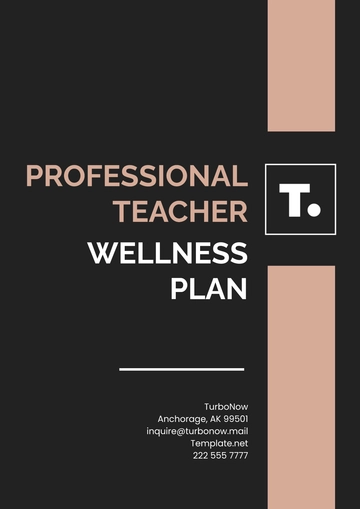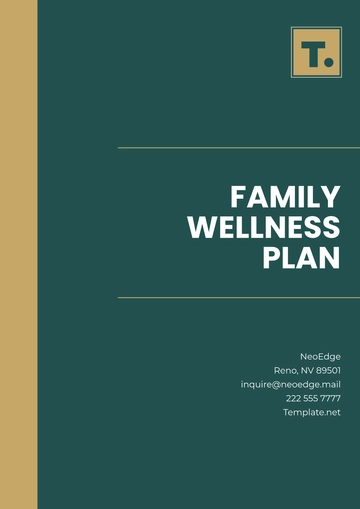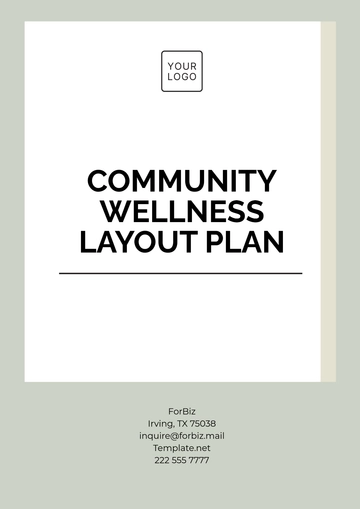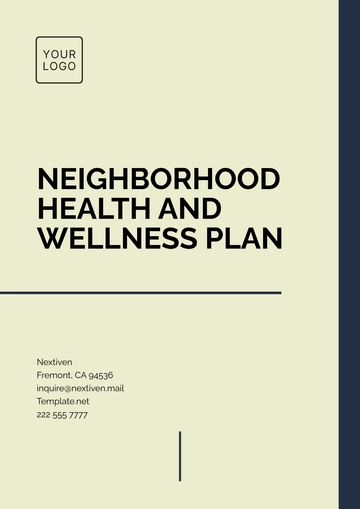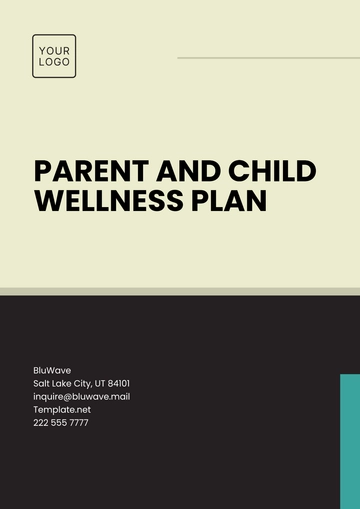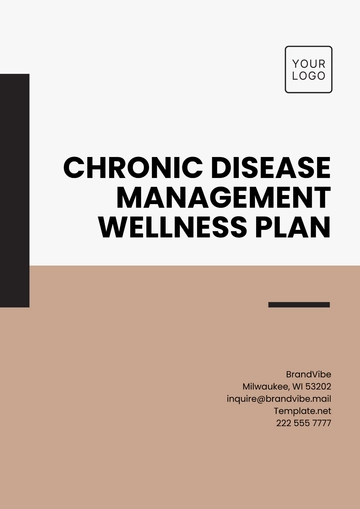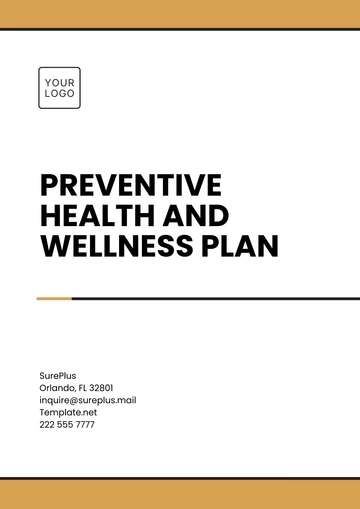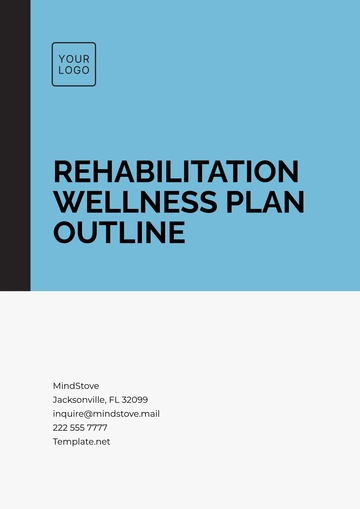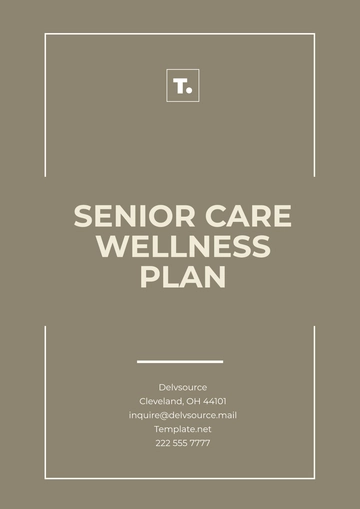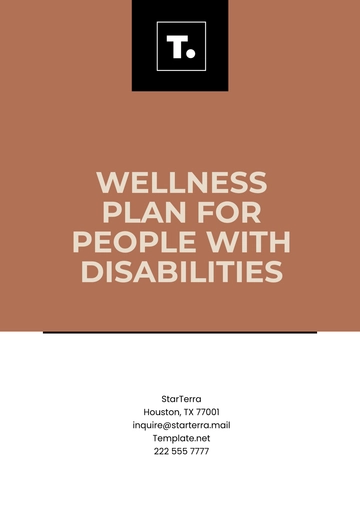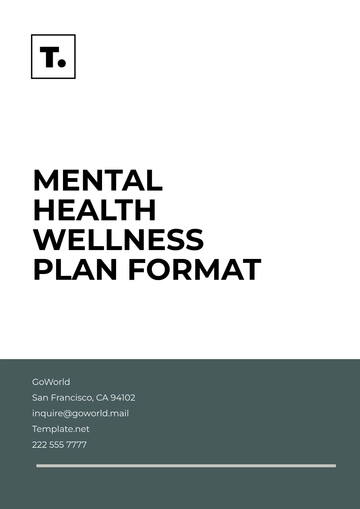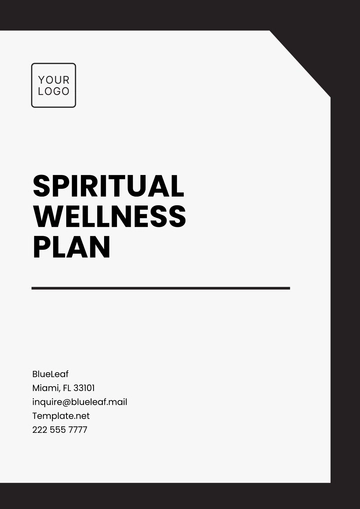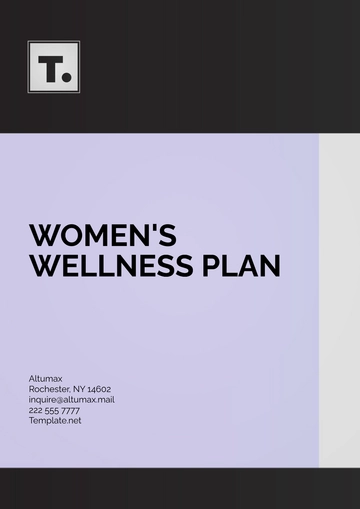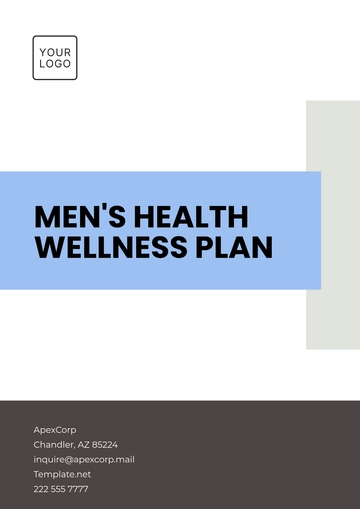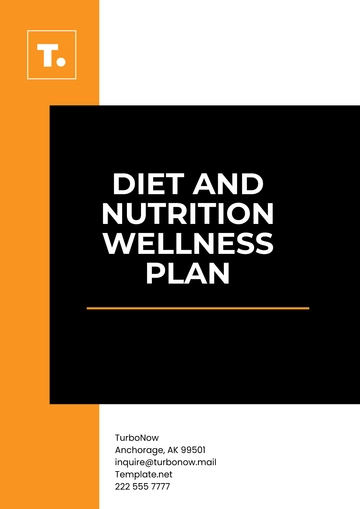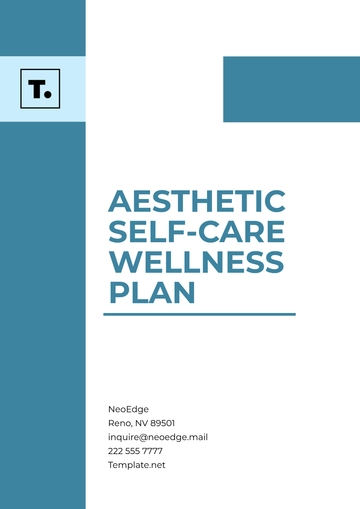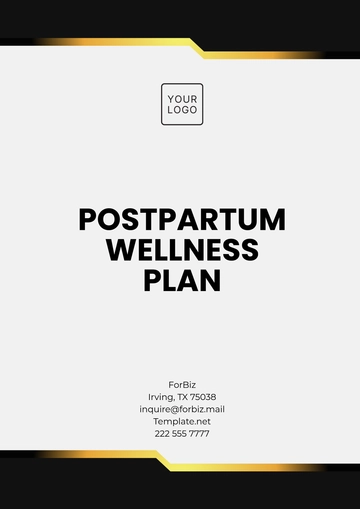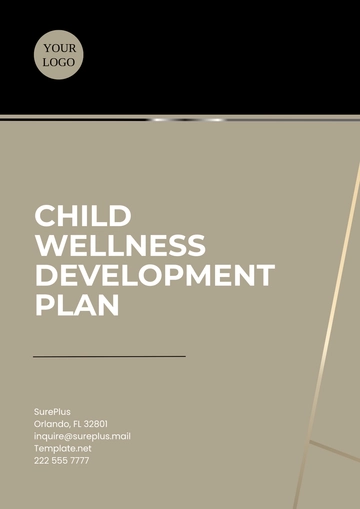Free Young Adult Wellness Plan
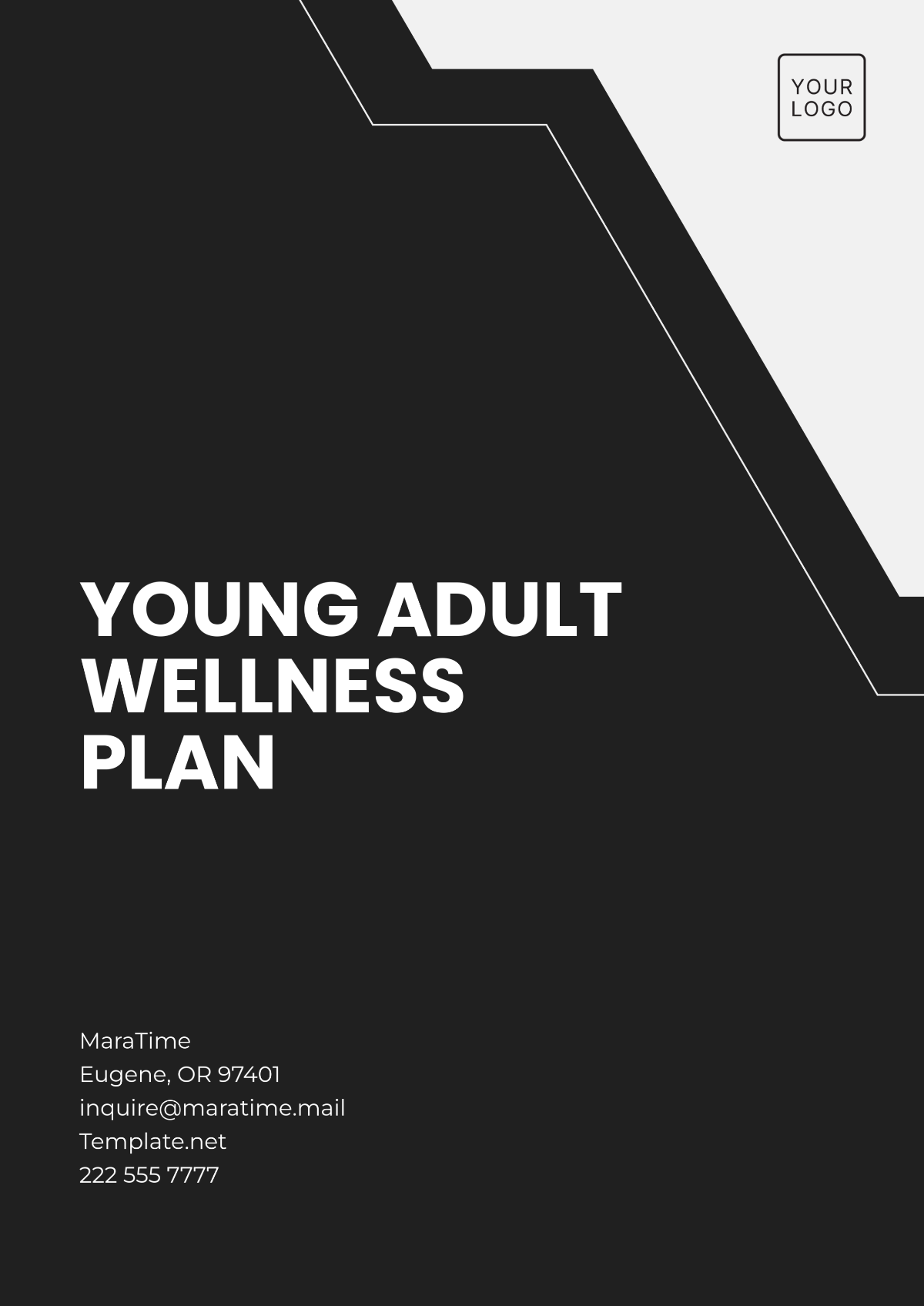
Prepared by: [Your Name]
Company: [Your Company Name]
Date: [Insert Date]
I. Introduction
The Young Adult Wellness Plan is designed to support individuals aged 18-30 in maintaining and improving their physical, mental, and emotional health. This plan aims to provide young adults with the resources and strategies necessary to thrive during a critical life stage, marked by significant transitions such as entering higher education, beginning careers, and developing long-term personal and professional goals. By integrating elements of physical wellness, mental health support, and lifestyle management, this plan will empower young adults to foster overall well-being and build a foundation for lifelong health.
II. Vision and Goals
A. Vision
To equip young adults with the tools and guidance needed to take charge of their health and well-being, creating a balanced life that supports academic, career, and personal growth.
B. Goals
Support Physical Health: Foster healthy habits in nutrition, exercise, and sleep, ensuring individuals maintain optimal energy and health.
Promote Mental and Emotional Resilience: Provide strategies for managing stress, anxiety, and other mental health challenges faced by young adults.
Encourage Social and Relational Wellness: Support the development of healthy relationships with peers, family, and community, promoting emotional well-being and support systems.
Enhance Career and Educational Success: Provide strategies for managing academic and career pressures, setting achievable goals, and finding a balance between work, school, and personal life.
Foster Healthy Lifestyle Choices: Encourage long-term habits, including healthy eating, physical activity, and stress management, that contribute to overall well-being and prevent future health issues.
III. Key Areas of Focus and Strategies
A. Physical Wellness
Strategies:
Exercise and Fitness: Promote a balanced exercise routine that includes cardiovascular, strength, and flexibility training. Encourage at least 150 minutes of moderate-intensity aerobic activity per week.
Nutrition: Develop a healthy eating plan that includes a variety of nutrient-dense foods. Encourage regular meals with a focus on fruits, vegetables, lean proteins, whole grains, and healthy fats.
Sleep Hygiene: Emphasize the importance of 7-9 hours of quality sleep per night and strategies for improving sleep quality, such as maintaining a consistent sleep schedule and minimizing screen time before bed.
Preventative Health Care: Educate on the importance of regular check-ups, vaccinations, and screenings to catch any potential health issues early.
B. Mental Health and Emotional Well-being
Strategies:
Stress Management: Teach relaxation techniques such as deep breathing, meditation, and mindfulness to reduce stress.
Mental Health Support: Provide access to counseling and therapy services for individuals experiencing anxiety, depression, or other mental health challenges.
Cognitive Behavioral Strategies: Implement cognitive behavioral therapy (CBT) principles to help manage negative thought patterns, boost motivation, and build self-esteem.
Mindfulness and Meditation: Incorporate mindfulness practices, such as yoga or guided meditation, to support emotional balance and mental clarity.
C. Social and Relational Wellness
Strategies:
Building Healthy Relationships: Provide resources for creating and maintaining strong, supportive relationships with friends, family, and romantic partners.
Community Engagement: Encourage involvement in community activities, volunteer work, or social clubs to build a sense of belonging and connection.
Communication Skills: Offer workshops or coaching on effective communication, conflict resolution, and building emotional intelligence.
D. Career and Educational Success
Strategies:
Time Management: Teach practical time management skills, such as setting goals, prioritizing tasks, and using productivity tools like planners or apps.
Goal Setting: Encourage individuals to set clear, realistic academic and career goals, breaking them into smaller steps to ensure continuous progress.
Work-Life Balance: Provide strategies for balancing the demands of work, school, and personal life, including setting boundaries and prioritizing self-care.
Career Counseling: Offer guidance on career planning, resume building, interview preparation, and networking.
E. Healthy Lifestyle Choices
Strategies:
Substance Use Awareness: Educate on the risks of alcohol, smoking, and drug use, and provide resources for those struggling with addiction or substance abuse.
Sexual Health Education: Provide information on safe sex practices, reproductive health, and resources for individuals seeking counseling or medical support.
Healthy Habits Formation: Encourage the development of consistent daily routines that support wellness, including meal prepping, exercising, and socializing.
Financial Wellness: Offer advice on budgeting, saving, and managing student loans or credit card debt to support long-term financial independence and security.
IV. Implementation Plan
A. Roles and Responsibilities
Health and Wellness Coaches: Guide individuals in achieving their health goals, offering personalized advice and encouragement.
Mental Health Professionals: Provide counseling, therapy, and support for mental health challenges.
Nutritionists and Fitness Experts: Develop personalized fitness and nutrition plans that align with each individual’s lifestyle.
Career Advisors: Assist with career exploration, goal setting, and job-search strategies.
B. Timeline
Phase 1 (Weeks 1-4): Initial assessment, goal setting, and introduction to wellness strategies. Focus on physical health and mental wellness practices.
Phase 2 (Weeks 5-8): Begin implementing fitness routines, stress management techniques, and time management strategies. Introduce nutrition and sleep guidelines.
Phase 3 (Months 2-6): Continue developing healthy habits, with a focus on building long-term lifestyle changes. Provide ongoing career and educational support.
Ongoing (6+ Months): Continue with check-ins and refine goals as needed. Offer ongoing support for career, health, and personal growth.
V. Evaluation and Monitoring
A. Key Performance Indicators (KPIs)
Physical Health Improvement: Measure improvements in strength, endurance, and overall fitness levels.
Mental Health Progress: Use regular assessments or surveys to monitor mental health, stress levels, and overall well-being.
Satisfaction with Wellness Plan: Gather feedback from participants to assess satisfaction with the plan and make adjustments as needed.
Goal Achievement: Track the achievement of career, academic, and personal goals set at the beginning of the plan.
B. Methods of Evaluation
Surveys and Feedback: Conduct regular surveys to gather participant feedback on the effectiveness of the wellness plan.
Progress Assessments: Measure improvements in fitness, nutrition, mental health, and career progress through regular check-ins.
Goal Tracking: Work with individuals to assess progress towards the goals they’ve set for their physical, emotional, and career well-being.
VI. Sustainability Plan
A. Ongoing Support
Continuous Check-ins: Provide periodic check-ins to offer support, monitor progress, and adjust the plan as necessary.
Workshops and Educational Sessions: Offer ongoing educational opportunities to reinforce healthy habits and skills.
Community Resources: Partner with local healthcare providers, fitness centers, and career development organizations to provide additional resources for young adults.
B. Funding and Resources
Grants and Sponsorships: Seek funding opportunities to expand and enhance the wellness plan.
Volunteer and Peer Support: Engage former participants in mentoring or peer support roles to ensure continued motivation and guidance.
VII. Conclusion
The Young Adult Wellness Plan offers a comprehensive, integrated approach to health, designed to address the unique challenges faced by young adults in today’s fast-paced world. By focusing on physical health, mental wellness, career development, and lifestyle choices, this plan aims to empower young adults to build a strong foundation for lasting well-being and success.
- 100% Customizable, free editor
- Access 1 Million+ Templates, photo’s & graphics
- Download or share as a template
- Click and replace photos, graphics, text, backgrounds
- Resize, crop, AI write & more
- Access advanced editor
You may also like
- Finance Plan
- Construction Plan
- Sales Plan
- Development Plan
- Career Plan
- Budget Plan
- HR Plan
- Education Plan
- Transition Plan
- Work Plan
- Training Plan
- Communication Plan
- Operation Plan
- Health And Safety Plan
- Strategy Plan
- Professional Development Plan
- Advertising Plan
- Risk Management Plan
- Restaurant Plan
- School Plan
- Nursing Home Patient Care Plan
- Nursing Care Plan
- Plan Event
- Startup Plan
- Social Media Plan
- Staffing Plan
- Annual Plan
- Content Plan
- Payment Plan
- Implementation Plan
- Hotel Plan
- Workout Plan
- Accounting Plan
- Campaign Plan
- Essay Plan
- 30 60 90 Day Plan
- Research Plan
- Recruitment Plan
- 90 Day Plan
- Quarterly Plan
- Emergency Plan
- 5 Year Plan
- Gym Plan
- Personal Plan
- IT and Software Plan
- Treatment Plan
- Real Estate Plan
- Law Firm Plan
- Healthcare Plan
- Improvement Plan
- Media Plan
- 5 Year Business Plan
- Learning Plan
- Marketing Campaign Plan
- Travel Agency Plan
- Cleaning Services Plan
- Interior Design Plan
- Performance Plan
- PR Plan
- Birth Plan
- Life Plan
- SEO Plan
- Disaster Recovery Plan
- Continuity Plan
- Launch Plan
- Legal Plan
- Behavior Plan
- Performance Improvement Plan
- Salon Plan
- Security Plan
- Security Management Plan
- Employee Development Plan
- Quality Plan
- Service Improvement Plan
- Growth Plan
- Incident Response Plan
- Basketball Plan
- Emergency Action Plan
- Product Launch Plan
- Spa Plan
- Employee Training Plan
- Data Analysis Plan
- Employee Action Plan
- Territory Plan
- Audit Plan
- Classroom Plan
- Activity Plan
- Parenting Plan
- Care Plan
- Project Execution Plan
- Exercise Plan
- Internship Plan
- Software Development Plan
- Continuous Improvement Plan
- Leave Plan
- 90 Day Sales Plan
- Advertising Agency Plan
- Employee Transition Plan
- Smart Action Plan
- Workplace Safety Plan
- Behavior Change Plan
- Contingency Plan
- Continuity of Operations Plan
- Health Plan
- Quality Control Plan
- Self Plan
- Sports Development Plan
- Change Management Plan
- Ecommerce Plan
- Personal Financial Plan
- Process Improvement Plan
- 30-60-90 Day Sales Plan
- Crisis Management Plan
- Engagement Plan
- Execution Plan
- Pandemic Plan
- Quality Assurance Plan
- Service Continuity Plan
- Agile Project Plan
- Fundraising Plan
- Job Transition Plan
- Asset Maintenance Plan
- Maintenance Plan
- Software Test Plan
- Staff Training and Development Plan
- 3 Year Plan
- Brand Activation Plan
- Release Plan
- Resource Plan
- Risk Mitigation Plan
- Teacher Plan
- 30 60 90 Day Plan for New Manager
- Food Safety Plan
- Food Truck Plan
- Hiring Plan
- Quality Management Plan
- Wellness Plan
- Behavior Intervention Plan
- Bonus Plan
- Investment Plan
- Maternity Leave Plan
- Pandemic Response Plan
- Succession Planning
- Coaching Plan
- Configuration Management Plan
- Remote Work Plan
- Self Care Plan
- Teaching Plan
- 100-Day Plan
- HACCP Plan
- Student Plan
- Sustainability Plan
- 30 60 90 Day Plan for Interview
- Access Plan
- Site Specific Safety Plan
